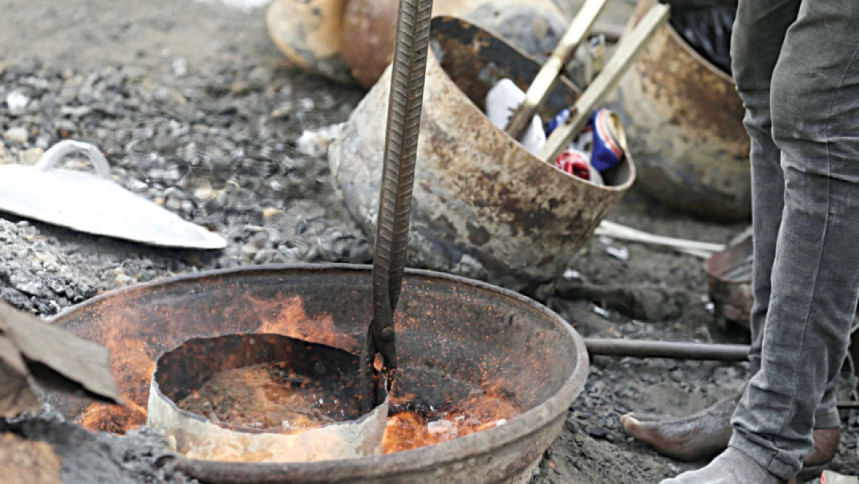Legal enforcement can protect our children from lead poisoning

Widespread lead exposure continues to pose a serious but under-recognised threat to public health in Bangladesh, with devastating consequences for millions of children. Experts from icddr,b and international collaborators recently presented alarming findings regarding the extent of the crisis. Data from a 2022-2024 study in Dhaka revealed that 98 percent of children aged two to four years had blood lead levels (BLLs) exceeding the reference threshold of 35 µg/L set by the US Centers for Disease Control and Prevention (CDC), with a median BLL of 67 µg/L. Not a single child tested had a lead-free result. These figures are not only medically concerning but also represent a national emergency requiring immediate legal, regulatory, and social attention.
Bangladesh was identified as the fourth most lead-impacted country globally by UNICEF, with 35 million children affected. The UNICEF report and icddr,b findings serve as a grim reminder that this is not merely a health issue but a rights-based crisis. Lead exposure severely impairs brain development, causing irreversible cognitive deficits, behavioural disorders, and stunting. These effects violate the rights of children under both domestic and international legal frameworks. Article 24 of the Convention on the Rights of the Child (CRC), ratified by Bangladesh, requires the state to ensure the highest attainable standard of health for children, including protection from environmental pollution. Similarly, Article 18(1) of the Constitution of Bangladesh obliges the state to improve public health and nutrition. The fact that lead poisoning continues to spread largely unchecked demonstrates an institutional failure to uphold these commitments.
While commendable interventions, such as reducing turmeric adulteration from 47 percent in 2019 to under one percent by 2021, have been achieved through research collaborations and actions by icddr,b and the Bangladesh Food Safety Authority (BFSA), some sources of lead—cookware, cosmetics, dust, and informal industries—remain unregulated. The Consumer Rights Protection Act, 2009, prohibits harmful goods and authorises penalties under Section 43. However, enforcement is weak. Agencies like the Bangladesh Standards and Testing Institution (BSTI) and the Department of Environment (DoE) must take responsibility for monitoring consumer safety and environmental risks to children's health.
The ongoing crisis underscores the urgent need for institutional accountability in monitoring industrial approvals and certifying product safety, including cosmetics and cookware. In the absence of science-based regulation and consistent enforcement, harmful products and practices continue to circulate, endangering public health. According to the World Health Organization (WHO), lead exposure during pregnancy, which can cross the placenta and harm the fetus, poses serious intergenerational risks. Despite clear evidence of danger, polluting industries still operate near densely populated areas, exposing children to toxic fumes and dust. Coordinated regulatory action is essential to prevent long-term harm and protect the health and rights of future generations in Bangladesh.
The judiciary in Bangladesh has, in principle, recognised the right to a healthy environment as a fundamental constitutional guarantee. In the landmark case of Dr Mohiuddin Farooque v Bangladesh (1996), the Supreme Court announced that environmental degradation could amount to a violation of Article 32 of the constitution, which ensures the right to life. Later, in a writ petition, the court ordered the government to take action against harmful air pollutants, reinforcing the legal doctrine that public health is inseparable from environmental protection. Such precedents must be invoked again to protect children from lead exposure by filing fresh public interest litigations under Article 102 of the constitution and demanding accountability from regulatory bodies.
Along with legal reform, public awareness campaigns must be dramatically scaled up. While isolated health education initiatives exist, they have not reached the scale required to change public behaviour or pressurise informal industries. Community education through schools, religious institutions, and local government bodies is crucial, especially in urban slums and industrial belts where exposure rates are highest. Parents must be informed about the risks of using lead-based cookware and cosmetics.
Addressing the lead poisoning crisis demands a coordinated national strategy that aligns with the country's constitutional duties, international human rights obligations, and established judicial interpretations. Regulatory agencies must strengthen oversight, ensure compliance, and apply penalties where necessary. At the same time, the legal community should utilise available remedies to hold negligent actors accountable. Lasting progress will require sustained legal action, active institutional responsibility, and widespread public awareness to ensure that every child grows up in a safe and healthy environment.
Samia Jaman Karobi is lecturer at the Department of Law in R. P. Shaha University.
Views expressed in this article are the author's own.
Follow The Daily Star Opinion on Facebook for the latest opinions, commentaries and analyses by experts and professionals. To contribute your article or letter to The Daily Star Opinion, see our guidelines for submission.

 For all latest news, follow The Daily Star's Google News channel.
For all latest news, follow The Daily Star's Google News channel. 




Comments